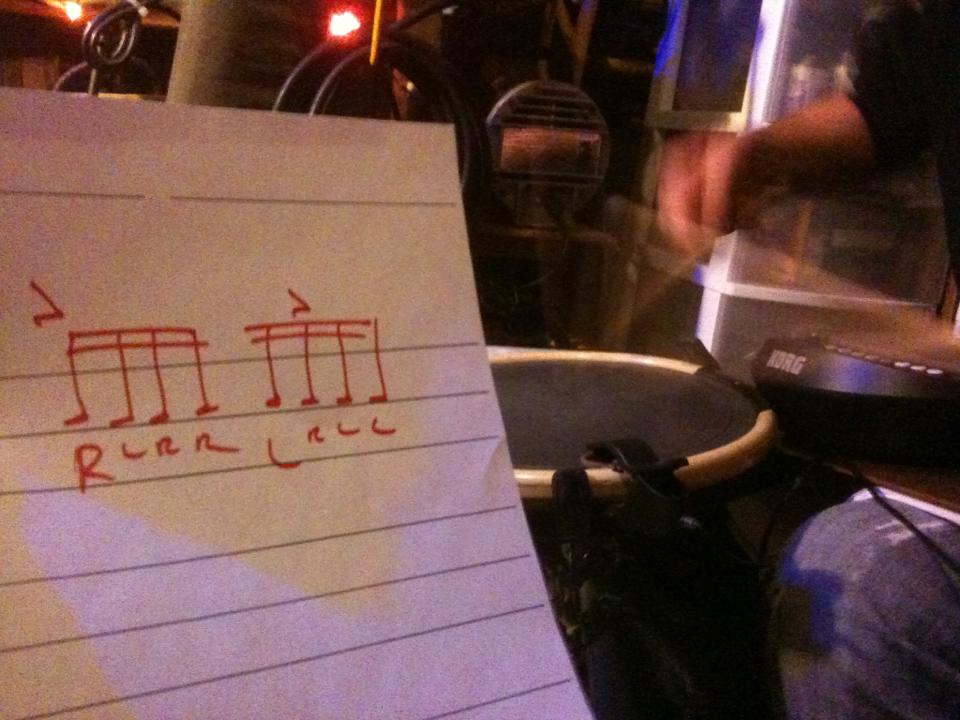A compilation of Lynda Carter as Diana Prince turning into Wonder Woman over and over and over again.
From Season 2; compare these to the considerably less stylized spins from Season 1.

A compilation of Lynda Carter as Diana Prince turning into Wonder Woman over and over and over again.
From Season 2; compare these to the considerably less stylized spins from Season 1.

Then move the accent around, ignoring the urge to change the sticking out of boredom. Here’s a good meditation exercise:
RLRR LRLL RLRR LRLL | RLRR LRLL RLRR LRLL |
RLRR LRLL RLRR LRLL | RLRR LRLL RLRR LRLL ||
Once you get that down, it’ll be stuck in your head for a while. When counted out, the accents go like this:
One, e three, e |
One, e three, e |
E two, e four |
E two, e four ||
For nearly three decades, Alex Van Halen’s drum intro in Hot for Teacher has been a source of debate among even the most accomplished drummers. Is it the bass drums? Is it triggers? What’s going on?
During a 20-year reunion hang last night, drummer Gary Ponder loosely demonstrated a cool idea for the right hand in the Van Halen classic. This right hand pattern is most apparent when played on the ride cymbal when the groove gets to 4/4. But when you apply the idea to the floor tom in the Harley intro (in 3/4), it all starts making sense.
In this approach, the trick isn’t with the feet. The feet are simply shuffling on the bass drums throughout. (L-R L-R L-R L-R…) Get that boogie tight. Then try this pattern with the right hand on ride cymbal during the 4/4 part; triplet feel:
XX- X– XX- X | XX- X– XX- X– | etc.
Then, working backward, play that idea on the floor tom in 3/4. Work the left hand into the mix with a 2 against 3 feel, and you’re probably getting close.
– – – – –
I love this idea for the right hand. Years ago, while tooling around with this song, I was applying Gary’s right-hand notes to the left hand. I wrote it down here.
Via the Internet, this is a Reticulated Python, native to Asia. It was found and gutted in what looks to be the swamps of Florida. One may presume it was somebody’s pet years ago, and released in the swamps when it became too big to handle.
Check out the size of that thing: [click to continue…]
From ProofreadNOW:
Should and would follow the same rules as shall and will in expressions of future time, determination, and willingness. The distinctions between ordinary and formal usage also apply here.
Ordinary: I would like to hear from you.
Formal: I should like to hear from you.Ordinary: We would be glad to see her.
Formal: We should be glad to see her.Ordinary: I would be pleased to serve on the committee.
Formal: I should be pleased to serve on the committee.a. Always use should in all persons to indicate “ought to.”
- I should study tonight.
- You should report his dishonesty to the manager.
- He should pay his debts.
b. Always use would in all persons to indicate customary action.
- Every day I would swim half a mile.
- They would only say, “No comment.”
- She would practice day after day.
c. Use should in all three persons to express a condition in an if clause.
- If I should win the prize, I will share it with you.
- If you should miss the train, please call me collect.
d. Use would in all three persons to express willingness in an if clause.
- If he would apply himself, he could win top honors easily.
- If you would delay your decision, I could offer you more attractive terms.
– – – – –
Source: The Gregg Reference Manual.